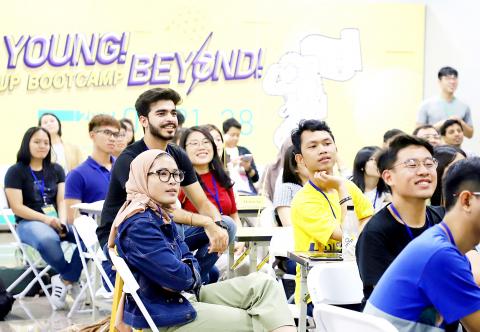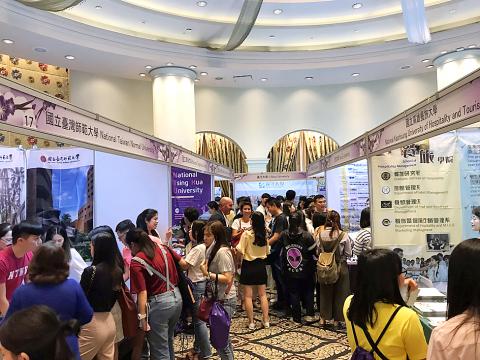With 51,970 students from countries included in the government’s New Southbound Policy studying in Taiwan in the last academic year, the Ministry of Education exceeded its original target of 48,000 students — and is well on the way to outperform its expectations this academic year.
Since the policy was launched in 2016-2017, the number has grown by about 60 percent and students from policy nations in the last academic year made up more than 40 percent of the foreign students in Taiwan, up from 28 percent in the first year.
On the other side, Taiwanese students heading to the 18 nations covered by the policy reached 21,000 in the last academic year, a 34.7 percent increase from 2016-2017.

Photo: CNA
The number of young Taiwanese either interning or volunteering in those nations through government initiatives last year reached 3,500.
Department of International and Cross-strait Education Affairs Director-General Bi Tzu-an (畢祖安) said that the goals of the New Southbound Talent Development Program remain the same, but now that the quantitative goals have been met the ministry can begin allocating more resources to improving the quality of the exchanges.
“We’re entering version 2.0,” Bi said. “We are shifting from output-based to outcome-based goals for every scholarship, program and initiative. We used to look at how many scholarships we offered per year, but can these people develop into talent that can benefit both sides when they enter the workforce? Will they help support and deepen our network in [our partner countries]?”

Photo: CNA
In the past, many of the exchanges and recruitment were done between academic institutions or goverment-supported organizations, with overseas operations carried out by universities under three programs: Taiwan Connection, the Taiwan Education Center and the Resource Center for Economic and Industry-Academy Cooperation.
The ministry in November last year announced that it would be integrating the three programs.
Bi said that the decision is part of the ministry’s goal to increase government-to-government initiatives to better assure the quality of students, as well as their educational experience in Taiwan.
It would also reduce the need for third-party brokers, further streamlining the process, he said.
The ministry in June announced that a trial “2+i” program — which encourages Indonesian junior-college graduates to enroll in two-year technology programs in Taiwan —would be expanded.
Launched in September last year, it is an example of a government-to-government program: The Indonesian government selects the students and provides incentives, such as air tickets and a NT$20,000 stipend, while Taiwan takes care of admissions and tuition.
Third-party brokers do not take part in the process.
As Thailand and Indonesia steer the region’s economic development toward “Industry 4.0,” there is a pressing need for high-tech talent in management and research.
Over the past two years, several schools have established joint graduate degrees with their counterparts in target nations.
National Chiao Tung University (交通大學) in May established a joint doctoral degree program with the Indian Institute of Technology (IIT) Delhi, adding to its existing dual-degree programs with four other IIT campuses. The program also aims to boost academic interaction between the schools since the research is carried out in both institutes.
Students focusing on semiconductors and optoelectronics have a preference for this particular program, which has a goal of 200 students graduating in the next two years.
To help with recruitment and to better prepare the students for Taiwan, ministry-sponsored Mandarin-language teachers have been sent to two IIT campuses to offer lessons and to better understand the needs of Indian students.
That is part of the ministry’s plan to support Mandarin-language education for foreign students — not only to prepare the students for life in Taiwan, but also in response to growing demand in other target nations.
The ministry in October last year launched a program that encourages Taiwanese to teach in India. Not only does this increase the ties between Taiwanese and Indian schools, the government hopes that the classes would pique students’ interest in studying in Taiwan.
A similar program was initiated with Vietnam in April.
“The program will reduce the culture shock when the students arrive in Taiwan,” National Chiao Tung University vice president Edward Chang (張翼) said. “They will have more confidence to live independently in Taiwan, and this will also raise their willingness to stay in Taiwan and work in the nation after graduating.”
The ministry in July launched the Chinese Teacher Training Program, which trains teachers specifically for students from New Southbound Policy nations so that they can provide customized classes that meet their needs. The training also includes classroom management, as well as basic counseling techniques.
“With adequate language skills these students can immerse themselves in Taiwanese society. Mandarin skills are invaluable if they want to work in a Taiwanese corporation or in the Asian market in general,” Bi said.
As there are far more students from New Southbound Policy nations coming to Taiwan than vice versa, the ministry would continue to provide incentives for Taiwanese to head to partner nations for either study or work, Bi said.
The interest is there: a King Car Cultural and Educational Foundation survey in October last year found that more than 67 percent of children and nearly 80 percent of university students were willing to consider studying or working in Southeast Asian nations.
The Mandarin teachers to India initiative is one component, while 2,013 students from 95 schools are taking part in the New Southbound Pilot Overseas Internship program this year.
Judging from the number of approved applications, the ministry expects to nearly double the number of participants next year.
The proposals are diverse — National Pingtung Institute of Science and Technology’s department of aquaculture is planning for its students to experience one-stop-shop shrimp farming in Brunei, while Mackay Medical College is partnering with the Mercy Community Service Aged Care Center in Brisbane, Australia.
The government is also targeting having Taiwanese doctoral graduates teaching long-term at universities in the target nations.
“Once people see the opportunities in these nations, they will no longer think that Europe, the US, Japan and South Korea are the only overseas options,” Bi said.
The final component is to provide more platforms for exchanges between Taiwan and New Southbound Policy target nations.
Expos are one of the main avenues — the ministry last month took 32 schools to the Taiwan Higher Education Fair in Manila.
The ministry in June last year launched the first Taiwan-India University President Forum at National Tsing Hua University (國立清華大學), where 11 Indian university deans met with 15 of their Taiwanese counterparts to engage in direct talks on academic and student exchanges, as well as other collaborations. This year’s forum is being held at India’s National Institute of Technology Warangal.
Similar academic exchanges also took place with Malaysia and the Philippines.
In the past few months, the Taiwan External Trade Development Council launched three New Southbound Market Recruitment Matching events in Taipei, Kaohsiung and Taichung, where 105 Taiwanese companies offered 1,300 positions.
Vietnam-based, Taiwanese-run Dai Phat Foods (大發食品) said that there is an urgent need for Vietnamese talent with experience of Taiwan and a wide range of capabilities — including marketing, sales and logistics.
“There are abundant opportunities for overseas students to stay in Taiwan or to work for a Taiwanese company in their home nation,” Bi said.

US climber Alex Honnold is to attempt to scale Taipei 101 without a rope and harness in a live Netflix special on Jan. 24, the streaming platform announced on Wednesday. Accounting for the time difference, the two-hour broadcast of Honnold’s climb, called Skyscraper Live, is to air on Jan. 23 in the US, Netflix said in a statement. Honnold, 40, was the first person ever to free solo climb the 900m El Capitan rock formation in Yosemite National Park — a feat that was recorded and later made into the 2018 documentary film Free Solo. Netflix previewed Skyscraper Live in October, after videos

Starting on Jan. 1, YouBike riders must have insurance to use the service, and a six-month trial of NT$5 coupons under certain conditions would be implemented to balance bike shortages, a joint statement from transportation departments across Taipei, New Taipei City and Taoyuan announced yesterday. The rental bike system operator said that coupons would be offered to riders to rent bikes from full stations, for riders who take out an electric-assisted bike from a full station, and for riders who return a bike to an empty station. All riders with YouBike accounts are automatically eligible for the program, and each membership account

A classified Pentagon-produced, multiyear assessment — the Overmatch brief — highlighted unreported Chinese capabilities to destroy US military assets and identified US supply chain choke points, painting a disturbing picture of waning US military might, a New York Times editorial published on Monday said. US Secretary of Defense Pete Hegseth’s comments in November last year that “we lose every time” in Pentagon-conducted war games pitting the US against China further highlighted the uncertainty about the US’ capability to intervene in the event of a Chinese invasion of Taiwan. “It shows the Pentagon’s overreliance on expensive, vulnerable weapons as adversaries field cheap, technologically

NUMBERS IMBALANCE: More than 4 million Taiwanese have visited China this year, while only about half a million Chinese have visited here Beijing has yet to respond to Taiwan’s requests for negotiation over matters related to the recovery of cross-strait tourism, the Tourism Administration said yesterday. Taiwan’s tourism authority issued the statement after Chinese-language daily the China Times reported yesterday that the government’s policy of banning group tours to China does not stop Taiwanese from visiting the country. As of October, more than 4.2 million had traveled to China this year, exceeding last year. Beijing estimated the number of Taiwanese tourists in China could reach 4.5 million this year. By contrast, only 500,000 Chinese tourists are expected in Taiwan, the report said. The report